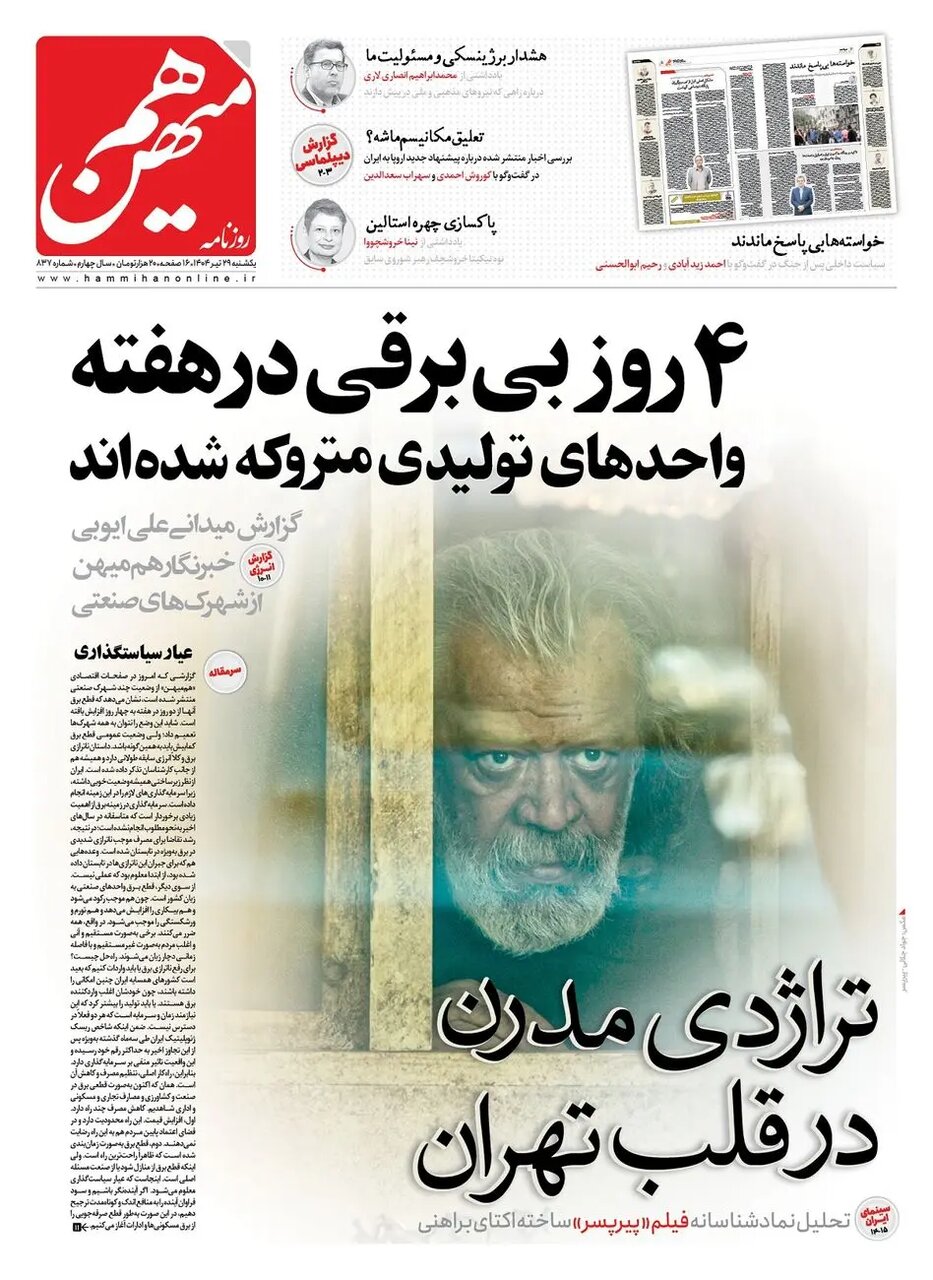‘Dirty campaign with political goals’

TEHRAN - In a note, Ham Mihan addressed Axios' claim about the option of stopping enrichment in Iran at Russia's request and wrote: Last week, after the Axios news outlet, citing Western diplomats, claimed that Russian President Putin had suggested in a message to Iran that the Islamic Republic accept the option of halting enrichment on its soil in the negotiations, a new controversy emerged about the Iran nuclear case.
As one of Iran’s main diplomatic supporters in the nuclear talks, Russia had supported Iran’s right to enrich uranium in recent years and had blamed the Western governments, especially the United States that withdrew from the JCPOA, for the controversy surrounding Iran’s nuclear program. The Russian Foreign Ministry called the claim by Axios a “dirty campaign with political goals” to damage Tehran-Moscow relations. The goal is clear: to create discord and pessimism between countries that have established good and constructive relations with each other. Our relationship with Russia is one based on respect and mutual interests. Russians know very well that the Islamic Republic of Iran makes independent decisions on all matters related to foreign policy, including the nuclear issue, and the Kremlin has always respected these independent decisions.
Vatan-e-Emrooz: Targeting Weizmann or world leadership!
In an analysis, Vatan-e-Emrooz addressed Iran’s detailed attacks on The Weizmann Institute of Science and wrote: From Iran’s view, the attack on this institute may be interpreted as a retaliatory measure in response to Israel’s attack in June. This attack could also indicate an increase in Iran’s missile capabilities and send a message about its deterrence power, counterattack or countermeasures, but from Israel’s view, the dimensions of this attack cannot be easily repaired. Iran’s attack has caused so much damage to this institute and has set back its strategic importance to such an extent that Zionist officials are promising to rebuild it by saying, “Israel will return to world leadership.” This was not a simple scientific center, but rather a key center in the development of Israel's advanced technologies. However, targeting this institution should also be considered an important part of the future geopolitical and regional security competition between Iran and Israel.
Khorasan: How to respond to hybrid war
In a recent commentary, Khorasan addressed the developments following the Iran-Israel conflict in June. It warned that new tensions emerging in Syria and Iraq signal a broader strategy by the U.S. and Israel to destabilize regional nations, aiming to disintegrate them and extend insecurity toward Iran's borders. The commentary also criticized Britain, France, and Germany for failing to uphold their commitments to the JCPOA and for attempting to trigger the snapback mechanism. These moves —both overt and covert—are viewed as elements of a wider hybrid war targeting Iran. The response to such a war, it asserted, must be multifaceted, combining offensive and defensive actions. As the armed forces continue to bolster their readiness, Iran’s diplomatic apparatus must mobilize all available legal and communicative tools. According to the piece, the enemy is wounded and now focused on probing Iran’s vulnerabilities. While Iranians have consistently demonstrated resilience in defending their homeland and ideals, the commentary emphasized that one of the key factors behind their continued strength is national unity. Preserving this unity, it urged, requires vigilance and active participation from all Iranians.
Iran: European purpose in snapback threat
In an interview with Heidar Ali Masoudi, a professor of international relations from Shahid Beheshti University, the Iran newspaper examined Europe's main goal in setting a deadline for the snapback mechanism. He said: It seems that Europe's ultimate goal in setting a deadline for activating the snapback mechanism by the end of August is not necessarily intended to restore Security Council sanctions. What is seen is an attempt to put political pressure on Iran, with the aim of pressuring Iran to give nuclear concessions or even on other issues, and paving the way for the Europeans to return to the negotiation process. The Europeans' preferred scenario is not to intensify international pressure, but to redefine their position in the nuclear diplomacy. In this context, one can get the impression that Europe is still trying to move within the framework of the previous order and its diplomatic principles. It is not that Europe has completely distanced itself from its multilateral diplomacy, but rather it continues to try to play the role of an active mediator, although it also uses pressure tools for this purpose.
Leave a Comment